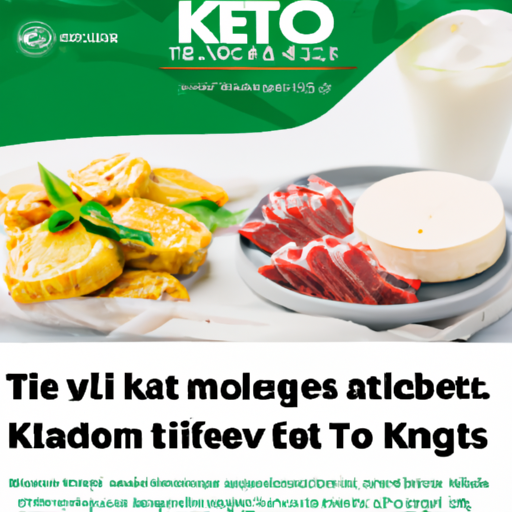So, you’re curious about what foods you should steer clear of while on a Keto diet? Well, you’ve come to the right place! In this article, we’ll dive into the foods that are not keto-friendly and can hinder your progress towards achieving ketosis. By being aware of these foods, you’ll be better equipped to make informed choices and stay on track with your keto journey. So, let’s get started!
Are you eager to learn more about which foods to avoid on a Keto diet? Well, look no further! In the upcoming article, we’ll provide you with a comprehensive list of foods that are a big no-no on a Keto diet. From carb-heavy treats to sneaky hidden sugars, we’ll cover it all. By familiarizing yourself with these foods, you’ll be able to make smart choices and maintain ketosis more effectively. So, stay tuned and get ready to discover the foods that may be sabotaging your keto success!

Understanding the Keto Diet
What is the Keto Diet?
The Keto Diet, short for Ketogenic Diet, is a low-carb, high-fat diet that has gained popularity over the years for its potential health benefits. The primary goal of the Keto Diet is to shift the body’s metabolism from using carbohydrates as its main source of energy to using fats, specifically ketones, for fuel. By severely limiting carbohydrate intake, the body enters a state called ketosis, where it starts burning fat for energy instead of carbohydrates.
How Does the Keto Diet Work?
The Keto Diet works by drastically reducing carbohydrate intake and increasing fat consumption. By doing so, the body begins to produce ketones, which are molecules produced by the liver from fatty acids when carbohydrate intake is restricted. Ketones serve as an alternative fuel source, providing the body with energy while maintaining stable blood sugar levels. This metabolic state of ketosis is what makes the Keto Diet effective for weight loss and improving overall health.
Benefits of the Keto Diet
The Keto Diet not only aids in weight loss but also offers several other benefits. Here are some of the potential advantages associated with following a Keto Diet:
-
Weight Loss: By reducing carbohydrate intake and increasing fat consumption, the Keto Diet can help stimulate weight loss by burning stored fat for energy instead of carbohydrates.
-
Improved Mental Focus: When the body enters ketosis, it produces ketones, which can provide a more stable source of energy for the brain. Many individuals on the Keto Diet report enhanced mental clarity and focus.
-
Increased Energy: By utilizing ketones as the primary source of fuel, the body can experience higher energy levels throughout the day.
-
Reduced Inflammation: The Keto Diet may help reduce inflammation in the body, which is associated with various chronic diseases and conditions.
-
Lowered Blood Sugar Levels: Since the Keto Diet restricts carbohydrate intake, it can help stabilize blood sugar levels and improve insulin sensitivity.
Foods to Avoid on a Keto Diet
Now that we have a basic understanding of the Keto Diet, let’s explore the foods that should be avoided when following this dietary approach. It’s essential to remember that the Keto Diet focuses on significantly reducing carbohydrate intake, so foods that are high in carbs should be limited or eliminated from your eating plan.
High Carbohydrate Foods
High carbohydrate foods should be avoided on a Keto Diet. These include:
- Bread
- Pasta
- Rice
- Potatoes
- Corn
- Cereal
- Baked goods
Starchy Vegetables and Grains
Starchy vegetables and grains are also high in carbohydrates and should be limited on a Keto Diet. Examples of starchy vegetables and grains include:
- Peas
- Sweet potatoes
- Quinoa
- Barley
- Corn
Sugary and Processed Foods
Sugary and processed foods are not only high in carbohydrates but also contain added sugars, which can disrupt the ketogenic state. Foods to avoid in this category include:
- Candy and sweets
- Cookies and pastries
- Ice cream and frozen desserts
- Chocolates and sweet snacks
Fruits with High Sugar Content
While fruits are generally considered healthy, some fruits have a high sugar content, making them unsuitable for a Keto Diet. Fruits to avoid or limit include:
- Bananas
- Grapes
- Mangoes
- Pineapples
- Oranges
- Apples
Legumes and Beans
Legumes and beans are also high in carbohydrates and should be avoided on a Keto Diet. Examples of legumes and beans to limit or eliminate include:
- Chickpeas
- Lentils
- Black beans
- Kidney beans
- Pinto beans
- Navy beans
Alcohol and Sugary Beverages
Alcoholic beverages and sugary drinks should be avoided on a Keto Diet due to their high carbohydrate and sugar content. Examples of beverages to avoid include:
- Beer
- Sweet wine
- Cocktails and mixed drinks
- Soft drinks
- Energy drinks
Unhealthy Fats and Oils
While the Keto Diet emphasizes consuming healthy fats, some fats and oils should be limited or avoided altogether due to their negative health effects. Unhealthy fats and oils include:
- Vegetable oils (corn, soybean, canola)
- Margarine and shortening
- Processed and fried foods
Condiments and Sauces
Certain condiments and sauces may contain hidden sugars and carbohydrates, making them unsuitable for a Keto Diet. Examples of condiments and sauces to avoid or choose carefully include:
- Ketchup
- Barbeque sauce
- Teriyaki sauce
- Honey mustard
- Salad dressings with added sugars
Artificial Sweeteners
While artificial sweeteners are low in calories and carbohydrates, they may still impact blood sugar levels and can trigger cravings for sweet foods. It is best to limit or avoid artificial sweeteners on a Keto Diet.
Are You a Ketosis Master? Take Our Quiz!
Understanding High Carbohydrate Foods
High carbohydrate foods play a significant role in your body’s ability to enter ketosis. It’s crucial to understand which foods fall into this category to ensure that you’re minimizing their consumption on a Keto Diet.
Bread, Pasta, and Rice
Bread, pasta, and rice are staples in many diets but are high in carbohydrates, making them unsuitable for a Keto Diet. Instead, opt for low-carb alternatives such as almond flour or coconut flour bread, zucchini noodles, or cauliflower rice.
Cereals and Breakfast Foods
Most cereals and breakfast foods contain high amounts of added sugars and refined grains, making them incompatible with a Keto Diet. Instead, try incorporating high-protein breakfast options such as eggs, bacon, avocado, or Greek yogurt.
Potatoes and Corn
Potatoes and corn are popular starchy vegetables that should be avoided on a Keto Diet due to their high carbohydrate content. Replace these with low-carb options such as cauliflower, broccoli, or spinach.
Flour and Baked Goods
Flour and baked goods, such as cookies, cakes, and pastries, are high in carbohydrates and should be avoided on a Keto Diet. Experiment with almond flour, coconut flour, or other low-carb flours instead.
Conclusion
In conclusion, understanding the foods to avoid on a Keto Diet is essential for its success and to reap its potential benefits. By eliminating or limiting high carbohydrate foods, starchy vegetables and grains, sugary and processed foods, fruits with high sugar content, legumes and beans, alcohol and sugary beverages, unhealthy fats and oils, condiments and sauces with added sugars, and artificial sweeteners, you can optimize your body’s ability to enter and maintain ketosis. It is also important to consult with a healthcare professional or registered dietitian before starting any new diet or making significant dietary changes. With proper planning and education, you can successfully follow a Keto Diet and achieve your health and wellness goals.
